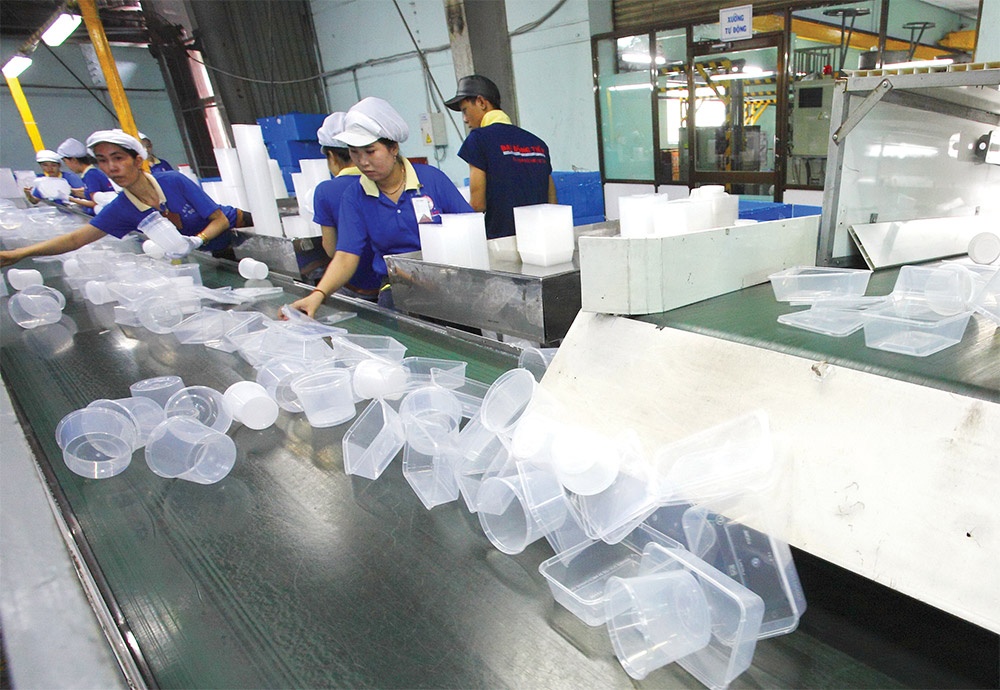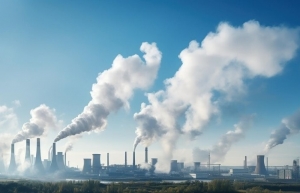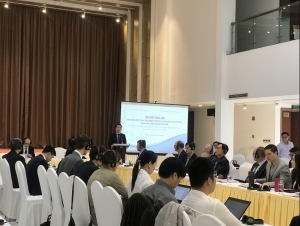Businesses take easy EPR compliance route
Issues related to regulations on recycling costs and supporting manufacturers and exporters in implementing extended producer responsibility (EPR) were discussed at a meeting between Deputy Prime Minister Tran Hong Ha and representatives of ministries and business associations on March 1.
Ha said, “It is necessary to encourage businesses to carry out their own recycling responsibilities or sign contracts with qualified recycling businesses according to the provisions of the Law on Environmental Protection. If an enterprise chooses to contribute recycling costs to the state fund, the contribution level should be based on survey data from qualified recycling enterprises, and priority will be given to enterprises with modern technology.”
 |
| Companies now need to comply with new recycling regulations, photo Le Toan |
The 2020 law stipulates that manufacturers must be responsible for recycling their products and packaging after being discarded by consumers, or contributing to an environmental protection fund to receive recycling support. Recycling is carried out on a voluntary basis, in which businesses can do it themselves or hire a reputable recycling unit.
But since January 1, regulations have been tightened. Manufacturers and importers of batteries, lubricants, tyres, and packaging will become the first to implement EPR regulations. The minimum recycling rates are 5 per cent of the products sold or imported for tyres, 8-12 per cent for batteries, and 10-22 per cent for packaging.
According to a report from the Ministry of Natural Resources and Environment (MoNRE), after two months of implementation, businesses often choose to make financial contributions to the environmental protection fund instead of recycling themselves, because they cannot fully comply with EPR regulations.
A representative of a business with nearly 50 years of experience in the dairy industry said that it accepted to contribute more than $415,000 per year to the fund because they have not found another solution to thoroughly collect and recycle packaging.
“Milk cartons are considered difficult to recycle because they are often made up of layers of paper, aluminium, and plastic. To be recycled, we have to go through many stages and apply modern lines and machinery,” the representative said.
Besides that, the representative said that the biggest problem was in the collection stage, as after being exposed to water, paper milk cartons will easily become brittle and damaged, making them more difficult to collect than plastic bottles and jars.
Currently, the company has also researched plans to invest in collection machines at points of sale. Customers who return the packaging after use will be given a QR code to accumulate points, and these points will be deducted from the product purchase price in the future.
“This solution is similar to the packaging deposit-return machine model that is widely applied in other countries. However, the investment cost of only one machine is over $80,000, and we need many machines for it to be effective,” the representative added.
According to the MoNRE, Vietnam is among the top 20 countries with the largest amount of waste. Counting milk cartons alone, each year Vietnam releases 10-15 billion cartons into the environment, but the recycling rate is less than 5 per cent.
According to Nestlé Vietnam, new EPR regulations do not allow businesses to combine self-recycling and payment of recycling fees. Therefore, there are businesses that, despite recycling their packaging according to regulations, still have to pay a fee because a small percentage cannot be recycled.
According to senior corporate affairs manager of Nestlé Vietnam Le Thi Hoai Thuong, some EPR implementation plans have been applied by businesses for many years, including transparent declarations of the volume of packaging to be recycled.
“We’ve continuously improved packaging design to reduce and eliminate unnecessary materials, reduce the use of virgin plastic, and replace it with environmentally friendly materials. These activities helped us reduce nearly 2,400 tonnes of plastic packaging in the 2021-2022 period,” Thuong said. “We also work with recyclers to come up with self-recycling plans in Vietnam.”
Nguyen Huu Tien, general director of Hanoi Urban Environment, said that recycling activities in Vietnam mainly relied on informal forces such as scrap collectors, scrap dealers, and recycling craft villages.
“It is required to have a standard process from collection to recycling. We seriously lack recycling infrastructure that meets EPR standards, especially factories capable of recycling all types of waste,” Tien emphasised.
Nguyen Hong Quan, director at the Institute for Circular Economy Development, said that many businesses were confused when estimating and making financial plans for 2024 because the cost of recycling was large and affected business operations.
“Even though the law stipulates two options to demonstrate producer responsibility, businesses still lean towards the simplest option, which is paying money to the fund as a tax,” he said.
Dr. Nguyen Trung Thang, deputy director of the Institute of Strategy and Policy on Natural Resources and Environment under the MoNRE, said the positive impact of mandatory implementation of EPR responsibilities would cause many businesses to have breakthroughs in product design such as being easier to recycle, more environmentally friendly, and even creating products that do not need to be recycled.
“This will reduce the amount of waste released into the environment, stop overexploitation of resources, promote environmental protection, and develop a green economy,” he said. “Vietnam still does not have a truly strong official recycling industry, so initial implementation will face many difficulties. However, through policy implementation, we will form a formal recycling industry, gradually growing as expected.”
| Nguyen Hong Uy, representative American Chamber of Commerce in Vietnam The government’s directions to remove EPR troubles are very specific. First off, enterprises are allowed to combine both self-recycling and payment of recycling support in the same year for the same type of packaging and discarded products. They also have to pay recycling contributions based on settlement in line with the actual quantity at the end of the year and the payment deadline (at the end of Q1 of the next year); and they must research and propose preferential policies for environmentally friendly packaging or using recycled materials. However, the MoNRE has not yet proposed a solution to implement the directions of the government. Currently, combining both self-recycling and payment of financial support in the same year is difficult, but not all difficulties are blamed on businesses. Businesses can declare and report themselves, and then the MoNRE conducts the inspection. This is consistent with Vietnamese reality because it is difficult for us to recycle all their discarded product packaging, so they can both do it themselves and need support. But in the regulations, if a business can recycle up to 99 per cent, but 1 per cent remaining cannot be recycled, it is unreasonable for the business to pay all of the amount. In a very difficult economic context, it is very wasteful and costly for businesses to pay a huge amount of money (estimated at billions of US dollars) into the fund and wait until the end of the year for disbursement. This puts a burden on us. We hope that the government will monitor and urge the process of removing these difficulties quickly for businesses. We pledge to support Vietnam in implementing green transformation and sustainable development. Drastic and complete implementation of the government’s directions will enable Vietnam to quickly achieve these goals. Chu Thi Van Anh, vice chairwoman and general secretary, Vietnam Beer-Alcohol-Beverage Association Our association has some concerns related to EPR. Despite taking effect since January, the legal basis for implementation (such as feasibility study recycling cost norms) has not been issued. Enterprises are perplexed about how to implement it, and how to determine and evaluate recycling. To date, we cannot calculate and plan ourselves. Last December, the MoNRE issued a notice on the list of organisations authorised to recycle products and packaging. Of these, one organisation is authorised to do recycling of batteries, tyres, tubes, lubricants, and vehicles in the northern region, and one organisation is authorised to recycle packaging in the south. In February, the MoNRE updated this with a list of product and packaging recycling units, including 13 recyclers in the north and 11 in the south. The list of recyclers on the MoNRE website is very few (for example, there are three aluminium recyclers only) and cannot meet the demand, causing market imbalance, so recycling fees will be pushed up. We will fail in achieving policy goals because the policy is to encourage businesses to recycle themselves instead of paying the environmental protection fund. We need a clear criterion and some specific instructions to evaluate the completion of recycling for businesses, and the mechanisms for inspection and control of the implementation of recycling responsibilities. This will certainly increase costs for businesses. We propose to consider implementing the EPR policy in some stages, with a transition period of at least two years from the effective date of the regulations, to encourage business compliance and recycling efficiency. The MoNRE should research and propose preferential policies for environmentally friendly packaging or the use of recycled materials, following the goal of the circular economy. We propose to add preferential policies and regulations for organisations and individuals producing and importing environmentally friendly packaging and products, for example, being granted a Vietnamese eco-label and converting to packaging costs for Vietnam’s environmental protection fund. |
 | Energy-related CO2 emissions hit record levels in 2023: IEA Energy-related carbon dioxide emissions rose to a record level in 2023, but the growth slowed from previous years thanks to continued expansion of clean technologies, the International Energy Agency said Friday. |
 | Extended producer responsibility in solid waste management The workshop on extended producer responsibility (EPR) in solid waste management provided a holistic view on creating a more comprehensive and effective EPR legal system in Vietnam. |
What the stars mean:
★ Poor ★ ★ Promising ★★★ Good ★★★★ Very good ★★★★★ Exceptional
Related Contents
Latest News
More News
- PM outlines new tasks for healthcare sector (February 25, 2026 | 16:00)
- Ho Chi Minh City launches plan for innovation and digital transformation (February 25, 2026 | 09:00)
- Vietnam sets ambitious dairy growth targets (February 24, 2026 | 18:00)
- Masan Consumer names new deputy CEO to drive foods and beverages growth (February 23, 2026 | 20:52)
- Myriad risks ahead, but ones Vietnam can confront (February 20, 2026 | 15:02)
- Vietnam making the leap into AI and semiconductors (February 20, 2026 | 09:37)
- Funding must be activated for semiconductor success (February 20, 2026 | 09:20)
- Resilience as new benchmark for smarter infrastructure (February 19, 2026 | 20:35)
- A golden time to shine within ASEAN (February 19, 2026 | 20:22)
- Vietnam’s pivotal year for advancing sustainability (February 19, 2026 | 08:44)

 Tag:
Tag:




















 Mobile Version
Mobile Version